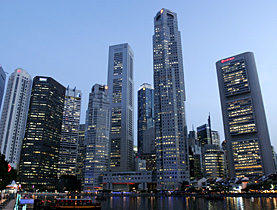Swiss banks should step up Islamic wealth drive

Switzerland faces a bigger threat from the developing private banking system in the Middle East than reaction to the minaret ban, according to one finance expert.
However, the controversial vote and subsequent condemnation should serve as a warning for the Swiss finance industry to better serve the needs of Islamic clients, observers believe.
Switzerland is waiting to see how far November’s referendum decision to ban the future construction of minarets will damage the country’s image and business interests.
So far, only Turkey has reacted with concrete retaliatory proposals by suggesting that its citizens withdraw assets held in Swiss banks. But the Swiss Bankers Association (SBA) is not expecting outflows of the estimated $200 billion (SFr208 billion) held by mainly Arabic clients in Switzerland.
“Muslim clients are very canny investors and appreciate the competence, quality of service, good advice and good performance they get from Swiss banks. Money knows no religion,” SBA spokesman James Nason told swissinfo.ch.
John Sandwick, head of Geneva-based group Islamic Wealth and Asset Management, told swissinfo.ch that the vote had stirred up resentment in the Middle East, but not enough to spark organised financial reprisals from wealthy Muslims.
“Switzerland did something really offensive against people who could really hurt us, but on this occasion it looks like it will not have a big impact on Swiss private banking in the long run,” he said.
Local competition
Having suffered setbacks in the United States and Europe in a bruising battle over tax evasion, Swiss banks are increasingly turning their attention to the Middle East, Asia and developing markets.
Switzerland is not the only European country to have identified lucrative prospects in the region and has long faced stiff competition from London, and to a lesser degree, from Paris to attract petro-dollars.
However the main threat in future may come from local banks setting up their own wealth management services, with a much wider array of Sharia compliant services.
“Lots of local private banks [in the Middle East] are starting up their own private banking businesses,” Sandwick told swissinfo.ch. “The domestic wealth management programme is already in the process of destroying the Swiss private banking model. It is not there yet, but it will not take too long.”
Sandwick believes the Swiss are taking too long to offer Middle Eastern clients a full range of private banking services that are compliant with Islamic legislation known as Sharia.
Sharia law, for example, prohibits the charging or payment of interest and investments associated with gambling, alcohol, tobacco, pornography or pork production.
Time is ripe
Despite Swiss banks being present in the oil rich region for many years and producing a steady trickle of Sharia compliant services – such as the recent wealth management offering by Bank Sarasin – Sandwick thinks they have barely scratched the surface of Islamic finance.
“All the locals are saying that they want Islamic financial products, but Swiss banks do not appear interested in doing anything,” he said. “These clients do not have access to plain vanilla [standard] wealth management with Fatwa [approval from Islamic clerics].”
Sandwick insisted that the time is ripe for Swiss private banking to make serious inroads into one of the few global regions to come out of the financial crisis with a steady supply of new wealth.
And he believes that Muslim clients would in future seek safe, conservative refuges for their assets after taking a battering with the recent fad for investing in complicated products. Switzerland’s reputation for solid, safe banking has lost some of its sheen after becoming entangled in the subprime crisis, but it still retains much of its private banking credibility.
“Right now is the time to penetrate further into this market because others have lost credibility,” he said.
Matthew Allen, swissinfo.ch
Sharia law prohibits the payment or charging of interest – called usury in the Koran. Products such as Sukuk bonds get around this employing a system of sharing capital gains.
The United States and Britain recognise that certain capital gains from Islamic products are tax exempt, but most European countries do not follow this principle.
Investments are limited to products sanctioned by a fatwa – an edict of approval from an Islamic scholar. Products associated with gambling, alcohol, tobacco, pornography and pork production are outlawed.
However, there remains confusion about what financial products and services can be offered, with Sharia scholars presenting different interpretations of the law.
To combat this, there have been calls for a global Sharia body to rule on Islamic financial matters.
Swiss banks that offer Sharia compatible services cannot be called Islamic banks. Only institutions from Muslim countries can carry this title.
In 2006, Faisal Bank became the the first Islamic financial institution to set up business in Switzerland.

In compliance with the JTI standards
More: SWI swissinfo.ch certified by the Journalism Trust Initiative












You can find an overview of ongoing debates with our journalists here . Please join us!
If you want to start a conversation about a topic raised in this article or want to report factual errors, email us at english@swissinfo.ch.